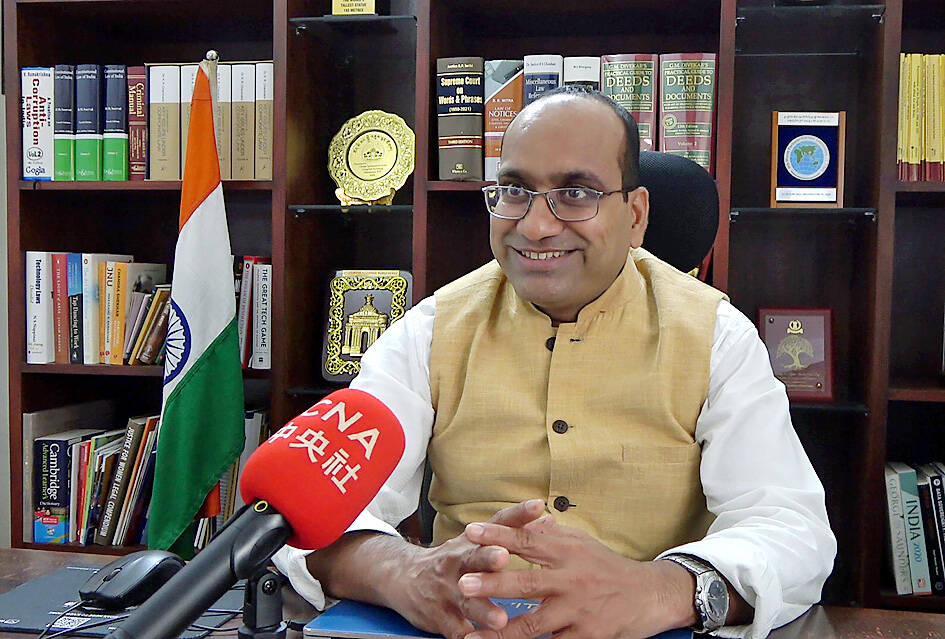Indian lawmaker Sujeet Kumar said he believes New Delhi should step up its political engagement with Taiwan, including through mutual visits by parliamentary delegations, to counter China’s “bullying” behavior.
Kumar, a member of the Biju Janata Dal party representing the eastern state of Odisha in the Rajya Sabha, India’s upper house of parliament, arrived in Taiwan on Sunday for a 10-day visit.
He is scheduled to deliver a speech at the Yushan Forum, meet with President Tsai Ing-wen (蔡英文) and Minister of Foreign Affairs Joseph Wu (吳釗燮), and visit several think tanks, business groups and universities.

Photo: CNA
In a media interview before leaving India for Taiwan, Kumar said he believes there is “immense potential” for developing Taiwan-India relations in the areas of trade, investment and tourism, as well as through educational and political exchanges.
“I think it’s necessary that the two countries come together, because we are both proud democracies. India is the largest democracy in the world, and Taiwan, [while] being a small nation, is a successful democracy,” he said.
He said that he plans to use the visit to explore the possibility of a free-trade agreement with Taiwan.
“In India, we are really hopeful that the Taiwanese semiconductor industry will look at India as a destination,” particularly as countries try to diversify their supply chains away from China, Kumar said.
Meanwhile, Taiwanese can learn from India’s successful service industry, and should also consider visiting the country as tourists, given its status as “the cradle of Buddhism,” he said.
In addition to building social and economic ties, Taiwan and India need to become closer politically, as both have relationships with China in which Beijing acts as “the aggressor,” whether it be in the Taiwan Strait or along the Line of Actual Control that serves as India and China’s de facto border, Kumar said.
While acknowledging that the Indian government might have reasons for adhering to a “one China” policy, Kumar said he does not believe that Taiwan or Tibet are a part of China.
Rather, it might be time for India’s government to “rethink its ‘one China’ policy,” and make clear that “China is a bully” which, if tolerated, would only act more aggressively, he said.
Kumar, elected to parliament in 2020, is also a cofounder of Formosa Club Indo-Pacific, a platform for international lawmakers working to enhance relations with Taiwan and help it connect with the world.

Taiwan has received more than US$70 million in royalties as of the end of last year from developing the F-16V jet as countries worldwide purchase or upgrade to this popular model, government and military officials said on Saturday. Taiwan funded the development of the F-16V jet and ended up the sole investor as other countries withdrew from the program. Now the F-16V is increasingly popular and countries must pay Taiwan a percentage in royalties when they purchase new F-16V aircraft or upgrade older F-16 models. The next five years are expected to be the peak for these royalties, with Taiwan potentially earning

STAY IN YOUR LANE: As the US and Israel attack Iran, the ministry has warned China not to overstep by including Taiwanese citizens in its evacuation orders The Ministry of Foreign Affairs (MOFA) yesterday rebuked a statement by China’s embassy in Israel that it would evacuate Taiwanese holders of Chinese travel documents from Israel amid the latter’s escalating conflict with Iran. Tensions have risen across the Middle East in the wake of US and Israeli airstrikes on Iran beginning Saturday. China subsequently issued an evacuation notice for its citizens. In a news release, the Chinese embassy in Israel said holders of “Taiwan compatriot permits (台胞證)” issued to Taiwanese nationals by Chinese authorities for travel to China — could register for evacuation to Egypt. In Taipei, the ministry yesterday said Taiwan

Taiwan is awaiting official notification from the US regarding the status of the Agreement on Reciprocal Trade (ART) after the US Supreme Court ruled US President Donald Trump's global tariffs unconstitutional. Speaking to reporters before a legislative hearing today, Premier Cho Jung-tai (卓榮泰) said that Taiwan's negotiation team remains focused on ensuring that the bilateral trade deal remains intact despite the legal challenge to Trump's tariff policy. "The US has pledged to notify its trade partners once the subsequent administrative and legal processes are finalized, and that certainly includes Taiwan," Cho said when asked about opposition parties’ doubts that the ART was

If China chose to invade Taiwan tomorrow, it would only have to sever three undersea fiber-optic cable clusters to cause a data blackout, Jason Hsu (許毓仁), a senior fellow at the Hudson Institute and former Chinese Nationalist Party (KMT) legislator, told a US security panel yesterday. In a Taiwan contingency, cable disruption would be one of the earliest preinvasion actions and the signal that escalation had begun, he said, adding that Taiwan’s current cable repair capabilities are insufficient. The US-China Economic and Security Review Commission (USCC) yesterday held a hearing on US-China Competition Under the Sea, with Hsu speaking on